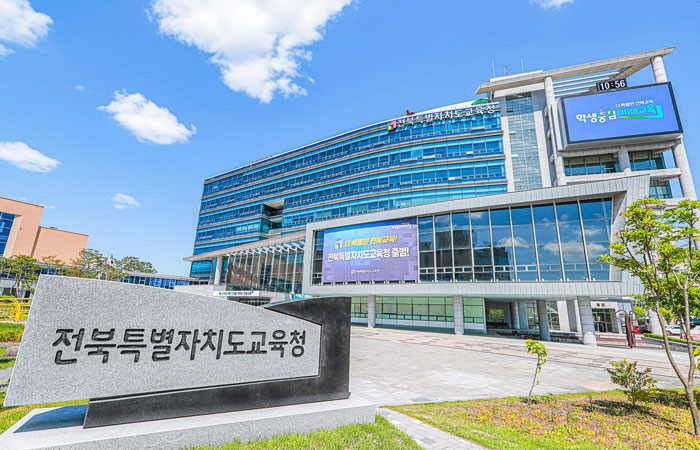전북지역공동(대표 김학산) 교육위원회(위원장 박준)는 7월 1일 배포한 보도자료에서 2022년부터 2025년까지 4개년에 걸친 대학수학능력시험(수능) 성적을 분석한 결과, 전북 지역 학력 수준이 전반적으로 하락하고 있으며, 특히 중위권 학생층의 붕괴가 심각한 상태라고 밝혔다. 이는 단순한 성적 저하를 넘어 전북 교육의 지속가능성 자체를 위협하는 구조적 위기로, 교육계 전반의 근본적 대응이 필요하다는 경고다.
전북지역공동이 발표한 자료 따르면, 이번 분석은 권혁선 정책자문(한국중등수석교사회 회장)이 한국교육과정평가원이 공개한 지역별 수능 성적 자료를 기반으로 진행되었으며, 국어·수학·영어 전 과목에서 전북의 1~2등급 비율이 매년 하락하고 있고, 교육의 ‘허리’ 역할을 하는 3~4등급 비율마저 전국 하위권으로 떨어졌다는 점에서 심각성이 제기된다.
3~4등급 중위권 성적 순위, 3년 연속 하락세
권 자문은 특히 “전북은 중위권 학생들을 위한 교육 전략 없이 상위권 성과만을 강조해 온 결과, 핵심 진학 계층이 무너지고 있다”며 “이들은 수시와 정시 모두에서 경쟁력을 잃고 대입 전략 수립이 어려운 구조에 내몰리고 있다”고 분석했다.
전북의 3~4등급 비율 전국 순위는 국어 13위, 수학 11위, 영어 14위(2025년 기준)로, 모든 과목에서 응시생 비율(전국 9위)보다 순위가 낮은 것으로 나타났다. 특히 영어의 경우 2022년 17위 → 2024년 15위 → 2025년 14위로 여전히 전국 최하위권을 벗어나지 못하고 있다.
| 연도 | 국어 (3~4등급 순위) | 수학 | 영어 |
| 2022 | 9위 | 10위 | 17위 |
| 2024 | 12위 | 9위 | 15위 |
| 2025 | 13위 | 11위 | 14위 |
※ 전북지역공동 인용 (2025.7.1)
성취평가와 진로 다양성 부재가 원인
전북 교육의 평가체계에도 문제가 있음을 지적했다. 전북은 성취평가제에서 A 성취 비율이 낮고, E 성취 비율이 높은 특징을 보여준다. 권 자문은 이를 “상위권 중심 교육과정 설계의 결과”로 해석하며, “이 구조에서는 다양한 학습자층이 설 자리를 잃는다”고 지적했다.
이러한 현상은 수능 성적 분포로도 이어지고 있다. 권 자문은 "내신과 수능은 서로 분리된 것이 아니라 긴밀히 연결된 구조"라며, "성취 수준에서의 격차는 곧 수능 성적 양극화로 이어지고 있다"고 분석했다.
'지역 인재 전형'에 대한 의존이 불러온 부작용
또 하나의 원인으로 ‘지역 인재 전형’에 지나치게 의존한 전북의 입시 전략을 지적했다. 법적 요건에 따른 지역 인재 중심의 선발 비율이 높지만, 그 전략이 다양성과 창의성보다는 정량 중심 평가에 치우쳐 있다는 것이다.
객관식 중심 정기고사, 획일적 수업과 평가 방식 등은 학생들의 학습 동기를 떨어뜨리고 진로 탐색의 기회를 제한하는 구조로 고착되어 있다는 비판이 함께 제기됐다.
충북 사례가 보여주는 중위권 전략의 가능성
타 시도의 사례와 비교 분석에서 2025학년도 입시에서 충북은 서울대에 101명(수시 94명, 정시 7명)의 합격자를 배출한 것에 주목하고 있다. 충북은 전반적인 수능 평균 성적은 전북보다 낮았지만, 3~4등급 중위권 비율에서 전북을 앞서며 전국 6위를 기록했다.
권 자문은 “충북 사례는 중위권을 중심으로 한 학력 회복이 지역 전체 교육 경쟁력으로 이어질 수 있음을 보여주는 대표적 모델”이라며, 전북도 더 이상 상위권 착시에 안주하지 말고 ‘허리를 세우는 교육 전략’으로 방향을 전환해야 한다고 강조했다.
“중위권 강화 없이는 전북 교육의 미래 없다”
전북지역공동은 이번 분석을 통해 전북 교육 행정이 ‘현상 유지’나 과거 정책 반복에 그칠 것이 아니라, 중위권 회복을 위한 실질적인 대책을 세워야 한다고 촉구했다. 전북지역공동은 특히 교육감 권한대행 체제가 일시적 체제로 머무는 것이 아니라, 오히려 전환점이 되어야 한다고 강조했다.


